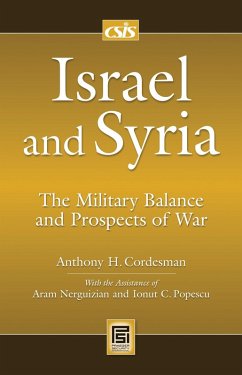Israel and Syria: The Military Balance and Prospects of War provides a detailed and current picture of the military capabilities of Israel and Syria, reflecting the changes and lessons of the Israel-Hezbollah War in 2006 and other recent conflicts. It offers extensive analysis, supported by tables and charts, on the trends in military spending, arms imports and technology transfers, military manpower, weapons, and orders of battle. By going beyond military balance analysis, Cordesman examines the probable nature and results of a future war and how the readiness, capability, tactics, and technology on each side would shape its outcome.
Israel and Syria: The Military Balance and Prospects of War shows how a dangerous new conflict between both nations would cripple all strides in strategic gains and Israeli-Syrian diplomacy. On the other hand, peace negotiations would offer a safer, more productive relationship. Israel and Syria need to consider the true nature of their military balance and the undermining effect to both nations as well as the costs and risks of any future conflict. Although Syria does retain important options in terms of asymmetric and proxy conflicts, it would fail in its attempt to recapture the Golan. While Israel would almost certainly win a future war, it cannot make gains from acquiring more Syrian territory and a new war would create major problems with its neighbors and in dealing with the Palestinians.
The risk of a new Israeli-Syrian conflict is so serious that both sides need to understand the true nature of their military balance, and the costs and risks of any future conflict. Israel and Syria: The Military Balance and Prospects of War shows how dangerous a new conflict could be, that neither side can make lasting strategic gains from a future conflict, and that peace negotiations offer a far safer and more productive option. It provides a detailed and current picture of the military capabilities of Israel and Syria, reflecting the changes and lessons of the Israel-Hezbollah War in 2006 and other recent conflicts. Israel and Syria: The Military Balance and Prospects of War provides extensive analysis, supported by tables and charts, on the trends in military spending, arms imports and technology transfers, military manpower, weapons, and orders of battle. By going beyond military balance analysis, Cordesman examines the probable nature and results of a future war and how the readiness, capability, tactics, and technology on each side would shape its outcome.
Israel and Syria: The Military Balance and Prospects of War shows how a dangerous new conflict between both nations would cripple all strides in strategic gains and Israeli-Syrian diplomacy. On the other hand, peace negotiations would offer a safer, more productive relationship. Israel and Syria need to consider the true nature of their military balance and the undermining effect to both nations as well as the costs and risks of any future conflict. Although Syria does retain important options in terms of asymmetric and proxy conflicts, it would fail in its attempt to recapture the Golan. While Israel would almost certainly win a future war, it cannot make gains from acquiring more Syrian territory and a new war would create major problems with its neighbors and in dealing with the Palestinians.
The risk of a new Israeli-Syrian conflict is so serious that both sides need to understand the true nature of their military balance, and the costs and risks of any future conflict. Israel and Syria: The Military Balance and Prospects of War shows how dangerous a new conflict could be, that neither side can make lasting strategic gains from a future conflict, and that peace negotiations offer a far safer and more productive option. It provides a detailed and current picture of the military capabilities of Israel and Syria, reflecting the changes and lessons of the Israel-Hezbollah War in 2006 and other recent conflicts. Israel and Syria: The Military Balance and Prospects of War provides extensive analysis, supported by tables and charts, on the trends in military spending, arms imports and technology transfers, military manpower, weapons, and orders of battle. By going beyond military balance analysis, Cordesman examines the probable nature and results of a future war and how the readiness, capability, tactics, and technology on each side would shape its outcome.









